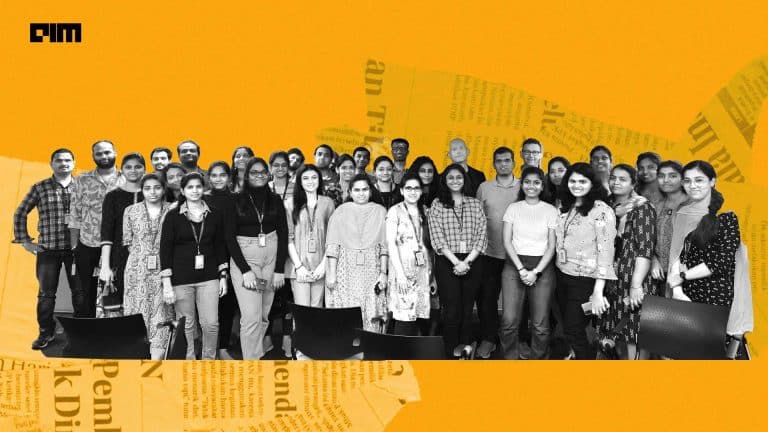Building a successful startup is a gargantuan task for anyone. In a male-dominated sector like tech, this poses a further challenge for women and, further yet, for transwomen.
As AIM had covered previously, people from marginalised backgrounds are often demonised, as evidenced by the recent Crowdstrike outage, which had many jumping to conclusions that the cause was “DEI engineers” rather than a lack of quality testing.
Speaking to AIM about her struggles coming out and navigating the industry shortly after graduating, Kanao R, an IIT Madras graduate and transwoman, said that success and authenticity aren’t mutually exclusive, and her achievements are a proof of this.
“Navigating my early career while coming to terms with my identity was challenging. My journey and achievements have, I hope, contributed to increasing the visibility and acceptance of queer individuals in the tech industry by demonstrating that success and authenticity are not mutually exclusive,” she said.
While initially studying mechanical engineering, Kanao found her love for AI when she managed to secure an internship in her first year at IIT Madras. “During my first year, despite the common belief that freshers couldn’t secure internships, I managed to work with a startup applying AI to fashion. This early experience cemented my interest in AI,” said Kanao.
“After a short stint at a tech startup based in Europe, I realised that there was massive potential in the Indian market. This eventually led me to start my own venture, Contineu AI,” she said.
How Do You Crack the Code for LGBTQIA+ Inclusion in AI?
While a lot of the conversations surrounding DEI in the AI industry revolve around how larger companies treat their employees, folks like Kanao have taken matters into their own hands.
Kanao is the founder and CTO of her own AI startup Contineu AI, alongside IIT Bombay graduate Harshil N, becoming an inspiration for many within the Indian LGBTQIA+ community. The startup has gained significant traction since its founding in 2023, having already secured pre-seed funding from Entrepreneur First early this year.
The Bengaluru-based startup is currently building the world’s first-ever AI-native construction project management platform and hopes to provide end-to-end visibility to developers and contractors across all their active sites using AI. Currently, the company is already catering to tier-1 and tier-2 real estate developers on a pilot-basis.
“We use helmet-mounted 360-degree cameras to extract all possible information about actual execution and inventory utilisation,” explained Kanao. “On top of this, we make sense of all of this data using an LLM layer that fundamentally understands construction processes, hence solving the data interoperability challenge that has kept software and technology adoption lower than average,” she added.
Apart from being the first AI startup to venture into this area of expertise, Contineu AI has also made it a point to prioritise the well-being of LGBTQIA+ folks within the company, setting an example for other Indian tech startups in doing things right.
“We explicitly state that we give preference to candidates from these communities to help balance the inherent biases in the broader job market. We believe this approach not only provides opportunities for underrepresented groups but also enriches our team with diverse perspectives,” said Kanao.
With a background working in several AI and tech startups, as well as her lived experience as a transwoman, Kanao has also made it a point to ensure that her startup remains a welcoming place for the LGBTQIA+ community.
“My leadership mantra is centred on fostering an inclusive and communicative environment where every team member understands their role in the larger picture and feels valued for their contributions.
“At Contineu AI, we make it a point to educate our team about the importance of using correct pronouns and respecting everyone’s identity.”
Additionally, the startup ensures that regular sensitivity training sessions and open discussions take place to ensure that their employees are protected and supported within a safe environment.
“Ensuring an inclusive and respectful environment for LGBTQIA+ identities involves actively promoting inclusivity and addressing any biases head-on,” she added.
What’s Lacking
While Kanao’s story might be one of very few trans success stories in the tech industry, this scarcity is not due to a lack of effort. Kanao said that oftentimes there is a major lack of data for trans and non-binary members of the community, as their workplaces are not conducive to them coming out.
“The issue of lacking data for trans and non-binary individuals in the tech industry can be understood through the lens of survivorship bias. The extreme lack of data on trans and non-binary individuals is largely because these individuals often lack the necessary protections and policies that encourage them to come out and be visible in their workplaces,” she said.
It’s one of the many reasons why DEI initiatives matter in the workplace, and as Kanao puts it, “For their support to be genuine, companies need to commit to inclusivity year-round, with supportive policies and continuous advocacy.”
Even with generative AI, Kanao pointed out that it could have a positive effect in bringing about the visibility of trans and non-binary folk, especially in the way language is used to be respectful. However, inherent biases need to be addressed when it comes to training. As Kanao pointed out, image-generation platforms can also rely on stereotypes, leading to worse outcomes for the LGBTQIA+ community.
“Platforms like Midjourney may depict LGBTQ+ individuals in narrow, culturally stereotypical ways, such as fashionable gay men or hypersexualised transwomen,” she said.
Overall, however, while the tech industry has a number of things to work on when it comes to acceptance, Kanao advises that LGBTQIA+ look after themselves and be cognizant of their environments.
“Coming out is a deeply personal journey, and each story is unique. Understanding whether your workplace is a safe space for you to come out is crucial. In my own experience, I was fortunate to have a supportive co-founder who stood by me throughout this journey.
“Remember, while coming out can be liberating, it’s important to do so at your own pace and comfort level,” Kanao concluded.

































